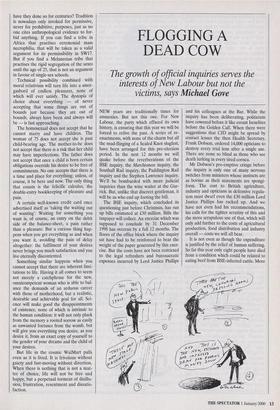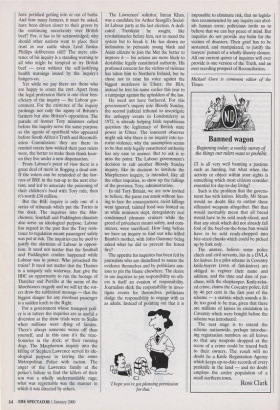FLOGGING A DEAD COW
The growth of official inquiries serves the interests of New Labour but not the
victims, says Michael Gave NEW years are traditionally times for amnesties. But not this one. For New Labour, the party which effaced its own history, is ensuring that this year we will be forced to relive the past. A series of re- enactments, with none of the charm but all the mud-flinging of a Sealed Knot slugfest, have been arranged for this pre-election period. In the next 12 months we will quake before the reverberations of the BSE inquiry, the Marchioness inquiry, the Southall Rail inquiry, the Paddington Rail inquiry and the Stephen Lawrence inquiry. We'll be bombarded with more judicial inquiries than the wine waiter at the Gar- rick. But, unlike that discreet gentleman, it will be us who end up footing the bill.
The BSE inquiry, which concluded its questioning just before Christmas, has run up bills estimated at £30 million. Bills the taxpayer will collect. An exercise which was supposed to conclude by 31 December 1998 has overrun by a full 12 months. The floors of the office block where the inquiry sat have had to be reinforced to bear the weight of the paper generated by this exer- cise. But the costs have not been restricted to the legal refreshers and bureaucratic ' expenses incurred by Lord Justice Phillips and his colleagues at the Bar. While the inquiry has been deliberating, politicians have cowered before it like errant Israelites before the Golden Calf. When there were suggestions that CJD might be spread by contact lenses the then Health Secretary, Frank Dobson, ordered 14,000 opticians to destroy every trial lens after a single use. There are none so blind as those who see death lurking in every tired cornea.
Mr Dobson's pre-emptive cringe before the inquiry is only one of many nervous twitches from ministers whose instincts are as bovine as their statements are spongi- form. The cost to British agriculture, industry and opticians in defensive regula- tion must dwarf even the £30 million Lord Justice Phillips has racked up. And we have not even had his recommendations, his calls for the tighter scrutiny of this and the more scrupulous use of that, which will only add further to the costs of agricultural production, food distribution and industry overall — costs we will all bear.
It is not even as though the expenditure is justified by the relief of human suffering. So far this year only eight people have died from a condition which could be related to eating beef from BSE-infected cattle. More have perished getting into or out of baths. And how many farmers, it must be asked, have been driven closer to their graves by the continuing uncertainty over British beef? For, it has to be acknowledged, why should other nations want to place their trust in our cattle when Lord Justice Phillips deliberates still? The mere exis- tence of his inquiry is a standing warning to all who might be tempted to try British beef — even without the self-justifying health warnings issued by the inquiry's hangers-on.
Yet while we pay there are those who are happy to count the cost. Apart from the legal profession there is one clear ben- eficiary of the inquiry — the Labour gov- ernment. For the existence of the inquiry prolongs not only the agony of Britain's farmers but also Britain's opposition. The parade of former Tory ministers called before the inquiry serve the same purpose as the agents of apartheid who appeared before South Africa's Truth and Reconcili- ation Commission: they are there to remind voters how wicked their past rulers were, the better to make them thank heav- en they live under a new dispensation.
From Labour's point of view there is a great deal of merit in flogging a dead cow. If the voters can be reminded of the hor- rors of BSE in the run-up to the next elec- tion, and led to associate the poisoning of their children's food with Tory rule, then it's worth £30 million.
But the BSE inquiry is only one of a series of tribunals which put the Tories in the dock. The inquiries into the Mar- chioness, Southall and Paddington disasters also serve an ideological purpose. Labour has argued in the past that the Tory resis- tance to regulation meant passengers' safety was put at risk. The inquiries can be used to justify the alarmism of Labour in opposi- tion. It need not matter that the Southall and Paddington crashes happened while Labour was in power. Who privatised the trains? It need not matter that the Thames is a uniquely safe waterway. Just give the BBC an opportunity to run the footage of Thatcher and Portillo at the scene of the Marchioness tragedy and we will let the vot- ers draw the subliminal message — that the biggest danger for any riverboat passenger is a sudden lurch to the Right.
For a government whose transport poli- cy is in tatters the inquiries are as useful a diversion as the show trials were to Stalin when millions were dying of famine. There's always someone worse off than yourself, and in this case it's the reac- tionaries in the dock; or their running dogs. The Macpherson inquiry into the killing of Stephen Lawrence served its ide- ological purpose in tarring the entire Metropolitan Police with racism. The anger of the Lawrence family at the police's failure to find the killers of their son was a wholly understandable rage; what was regrettable was the manner in which it was directed by others. The Lawrences' solicitor, Imran Khan, was a candidate for Arthur Scargill's Social- ist Labour party at the last election. A dedi- cated Trotskyist he sought, like revolutionaries before him, not to mend the system but to break it. He has shown no inclination to persuade young black and Asian citizens to join the Met the better to improve it — his actions are more likely to destabilise legally constituted authority. His professed concern for the victims of violence has taken him to Northern Ireland, but he chose not to raise his voice against the biggest murderers in Ulster, the IRA; instead he lent his name earlier this year to a campaign against the upholders of the law.
He need not have bothered. For this government's inquiry into Bloody Sunday, the second judicial tribunal to investigate the unhappy events in Londonderry in 1972, is already helping Irish republicans question the legitimacy of British state power in Ulster. The innocent observer might ask why there is no inquiry into ter- rorist violence, why the assumption seems to be that only legally constituted authority has any case to answer. But to ask is to miss the point. The Labour government's decision to call another Bloody Sunday inquiry, like its decision to institute the Macpherson inquiry, is intended, like all the other inquiries, to show up the failings of the previous, Tory, administration.
In old Tory Britain, we are now invited to believe, the paras ran amok without hav- ing to face the consequences, racist killings went ignored, tainted food was foisted on us while ministers slept, deregulatory zeal condemned pleasure cruisers while the greed of privatisers meant safety, and com- muters, were sacrificed. How long before we have an inquiry to find out who killed Bambi's mother, with John Gummer being asked what he did to prevent the forest fire?
The appetite for inquiries has been fed by journalists who are disinclined to assess the evidence themselves and by politicians anx- ious to pin the blame elsewhere. The desire to use inquiries to pin responsibility on oth- ers is itself an evasion of responsibility. Journalists shirk the responsibility to inves- tigate events for themselves, politicians dodge the responsibility to engage with us as adults. Instead of pointing out that it is `I hope you've got planning permission for that.' impossible to eliminate risk, that no legisla- tion recommended by any inquiry can abol- ish human error, politicians invite us to believe that we can buy peace of mind. But inquiries do not provide any balm for the victims of disasters. Their grief has to be sustained, and manipulated, to justify the lawyers' pursuit of a wholly illusory closure. All our current quiver of inquiries will ever provide is one version of the Truth, and an ever receding prospect of Reconciliation.
Michael Gove is comment editor of the Times.



















































 Previous page
Previous page